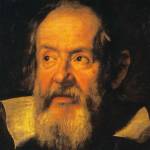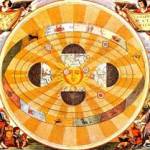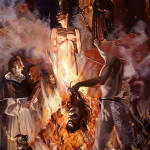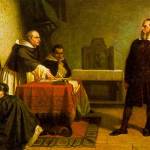[This week in my Introduction to Philosophy course, we’re reading Galileo’s “Letter to the Grand Duchess Christina” — published exactly 400 years ago — in which he argues that free inquiry in the sciences is compatible with religion rightly understood. Here is a re-posting of my Galileo and the Modern Compromise.]
Here is a re-posting of my Galileo and the Modern Compromise.]
IN HIS OPEN LETTER to the Grand Duchess Christina (1615), Galileo offered a defense of science against the prevailing heavy hand of religious orthodoxy:
“But I do not feel obliged to believe that that same God who has endowed us with senses, reason, and intellect has intended to forgo their use and by some other means to give us knowledge which we can attain by them. He would not require us to deny sense and reason in physical matters which are set before our eyes and minds by direct experience or necessary demonstrations.”
The immediate context was the great debate over the geocentric and heliocentric models. The larger context was the tension between religious philosophy, which stressed faith in revelation and tradition, and Renaissance philosophy, which stressed observation and reason. How, for example, should we decide whether the earth or the sun is at the center of our cosmos?  Should we trust the views handed down to us by the best theologians of the centuries, those views derived primarily from Scripture? Or should we trust the views presented to us by scientists, their theories based on observational data from telescopes and other instruments and mathematical calculations of that data?
Should we trust the views handed down to us by the best theologians of the centuries, those views derived primarily from Scripture? Or should we trust the views presented to us by scientists, their theories based on observational data from telescopes and other instruments and mathematical calculations of that data?
The traditionalist position was that reliance on observation and reason — when that conflicts with Scripture and tradition — is heresy. Giordano Bruno was convicted and executed, in part, for such heresy. When reason conflicts with faith, reason must give way. Or else.
Galileo’s solution is to argue that God wrote Scripture, of course, so Scripture contains the truth — and that God also created nature, and so nature also contains truth. God also created us humans, giving us sense organs and intelligence. So we can study Scripture rationally and learn important truths, as theologians do. But we can and should study nature rationally and learn important truths, as scientists do. And since both Scripture and nature come from the same author — God wrote two books, so to speak — the best theology and the best science should be compatible.
 Consequently, the real heretics are those who place faith over reason and who use apparent theoretical conflicts as a pretext for persecuting or killing their intellectual opponents. The truly devout, by direct contrast, are those who use their best intelligence, as God intended when He gave it to us, to try to understand the universe and who, when intellectual conflicts arise along the way, use reasonable methods — discussion, debate, and further investigation — to resolve them.
Consequently, the real heretics are those who place faith over reason and who use apparent theoretical conflicts as a pretext for persecuting or killing their intellectual opponents. The truly devout, by direct contrast, are those who use their best intelligence, as God intended when He gave it to us, to try to understand the universe and who, when intellectual conflicts arise along the way, use reasonable methods — discussion, debate, and further investigation — to resolve them.
I call this “the modern compromise” because versions of it are also found in Francis Bacon, René Descartes, and John Locke. In Galileo’s version, the intellectual turf is divided into two realms — the natural and the supernatural — and as long as scientists and theologians stick to their own turf, there should be no problems.
Locke uses the same dualist point is used to argue for the separation of church and state: “The boundaries on both sides are fixed and immovable. He jumbles heaven and earth together, the things most remote and opposite, who mixes these two societies, which are in their original, end, business, and in everything perfectly distinct and infinitely different from each other” (A Letter concerning Toleration [1689]).
So the early modern compromise is to use a strong metaphysical dualism to separate the natural and the supernatural, the realm of science and the realm of religion, the scope of the state’s power and the scope of the church’s, the physical and the spiritual, the factual and the moral. As long as everyone stays on their side of the line, we can avoid conflict.
I sometimes wonder to what extent the dualism was a genuine metaphysical claim by these founding modern thinkers — and to what extent it was a tactical claim to create a safety zone for naturalistic life and inquiry, given the often-dangerous religious orthodoxies of the time.
and to what extent it was a tactical claim to create a safety zone for naturalistic life and inquiry, given the often-dangerous religious orthodoxies of the time.
Despite having lost much of Europe to the Protestants over the preceding century, the Catholic Church was far from toothless, especially in southern Europe, and in 1616 it issued a Codex with a formal response to Galileo’s argument and the threat of heliocentrism:
“Propositions to be forbidden: That the sun is immovable at the center of the heaven; that the earth is not at the center of the heaven, and is not immovable; but moves by a double motion.”
Thus the stage was set for continued tension on both sides and Galileo’s trial for heresy in the 1633.
[The text of Galileo’s “Letter to the Grand Duchess Christina” is available at my Texts In Philosophy page.]
Here you make the classic error on the so called “Galileo Affair”, by imagining that this was at root some sort of basic debate between “science” and “religion” (and, one might add, the difference between the contemporaneous meaning of “science”–or even “religion:”– and the meaning used today. Your misunderstanding is the sort that has been push by the Left ever since the the French Revolution,
Galileo fell afoul of Vatican politics and was a foil in a broader struggle in the Church, particularly around Urban, who was in a crisis 0f his own, political struggles in Italy itself, and was at odds at least as much with the medieval Aristotelian tradition and it supporters. And of course it all of this must be viewed against the tumult of the times, including the 30 Years War, The 80 years war, and of course the Counter Reformation.
Given the facts at hand, Bellarmine’s original opinions and decisions were correct, that they were later manipulated and in part cast aside by actors such as Ingoli, Inchofer, et al. Is unfortunate, but has little to do with “religion: per se and more with Palace intrigue. In any evernt, as a parctical matter the whole thing was rather short lived, as Redi’s career and his empirical work clearly prove.
Actually, given that at the time in question Galileo could not actually prove his theory, Bellarmine was actually the better “scientist” in this case, a fview that has often been asserted, and one that the supporters of Galileo, that supposed exemplar of early empiricism, clearly like to ignore altogether.
As Feyerabend has said: “The Church at the time of Galileo kept much more closely to reason than did Galileo himself, and she took into consideration the ethical and social consequences of Galileo’s teaching too. Her verdict against Galileo was rational and just, and the revision of this verdict can be justified only on the grounds of what is politically opportune.”
Also, I would say that your discussion here of “dualism” could use a bit more thinking. Never mind the dualism, broadly drawn, has a quite ancient pedigree, and was widely followed in the medieval academy: “Scientific dualism” is a prerequisite for empiricism to work at all, pace Heisenberg, and certainly was part and parcel of the Galileo’s age so far as empiricism and and the “Scientific method”, if it can be called that, of that age. It is really unclear here what you mean by dualism. Metaphysical dualism? Scientific dualism (Scientific as in “the philosophy of science”)? There are many other meanings as well.
You case for some sort of dodge by “thinkers” of the time to avoid the wrath of the Church seem a but far fetched, and would seem to be based on a superficial and narrow. understanding of the history of that period. It is also philosophically shallow, at least as outlined here.
Given how the “Galileo Affair” has been misused by unscrupulous propagandist for some of the most damaging ideologies of the last 250 or years, I would think that you own it to your students to present this subject with the depth and diligence it requires rather than to hop on some ill-considered hobbyhorse
The Pope’s apology — 350 years later — for the Church’s persecution of Galileo: http://www.nytimes.com/1992/10/31/world/after-350-years-vatican-says-galileo-was-right-it-moves.html.
Stop lying that Galileo proposed Copernican Heliocentric theory. Because even Copernicus DID NOT present such a theory. Just a statement in chapter 11 of his book, listing planets and that they go around Sun.
Stop this bullshit. You cant’ present even ONE evidence that one of them used. Because there is N O N E !!
you know you don’t know. SO stop bluffing like there is such evidence. YOU IGONORANTS are INFURIATING!
Your lack of knowledge is self evident as now you realized that, you indeed can’t humiliate me. That’s why you can’t quote or find any evidence that either Copernicus or Galileo used to “prove” that Earth goes around Sun!
I demand that you call any professor in the world to help you!
Story that Galileo was heliocentric is FALSE.